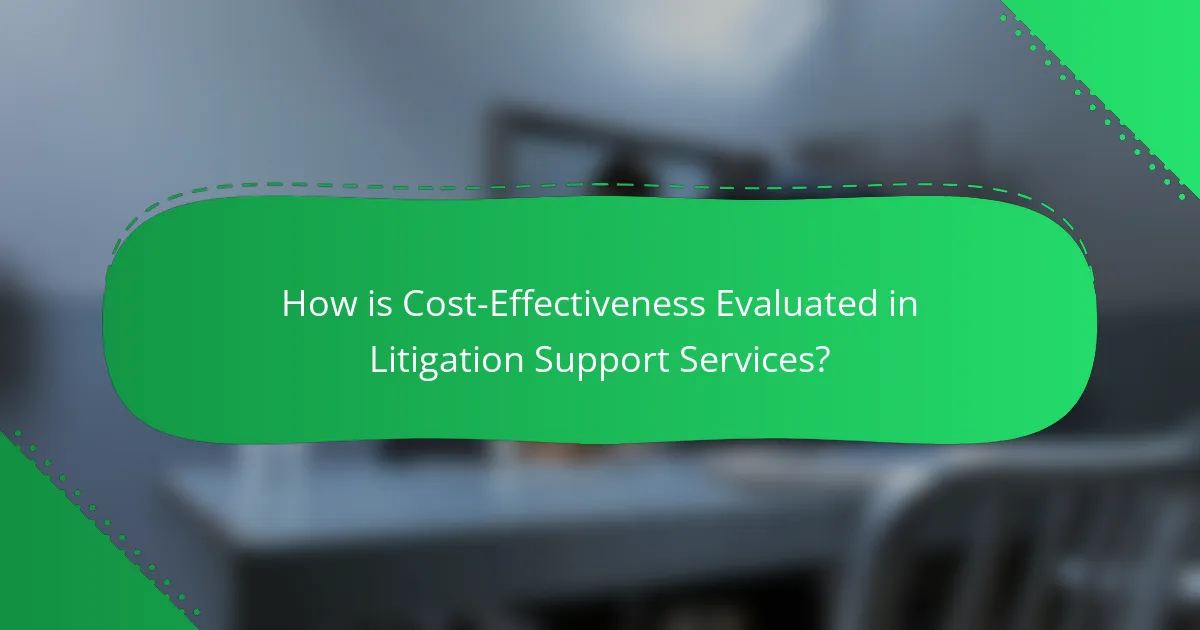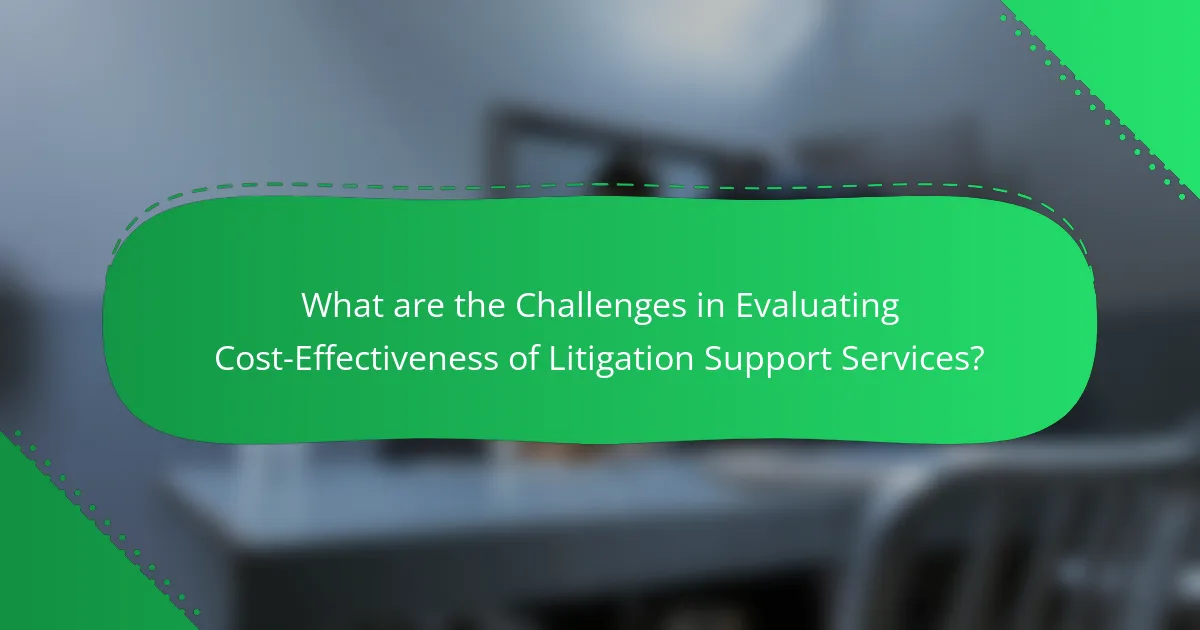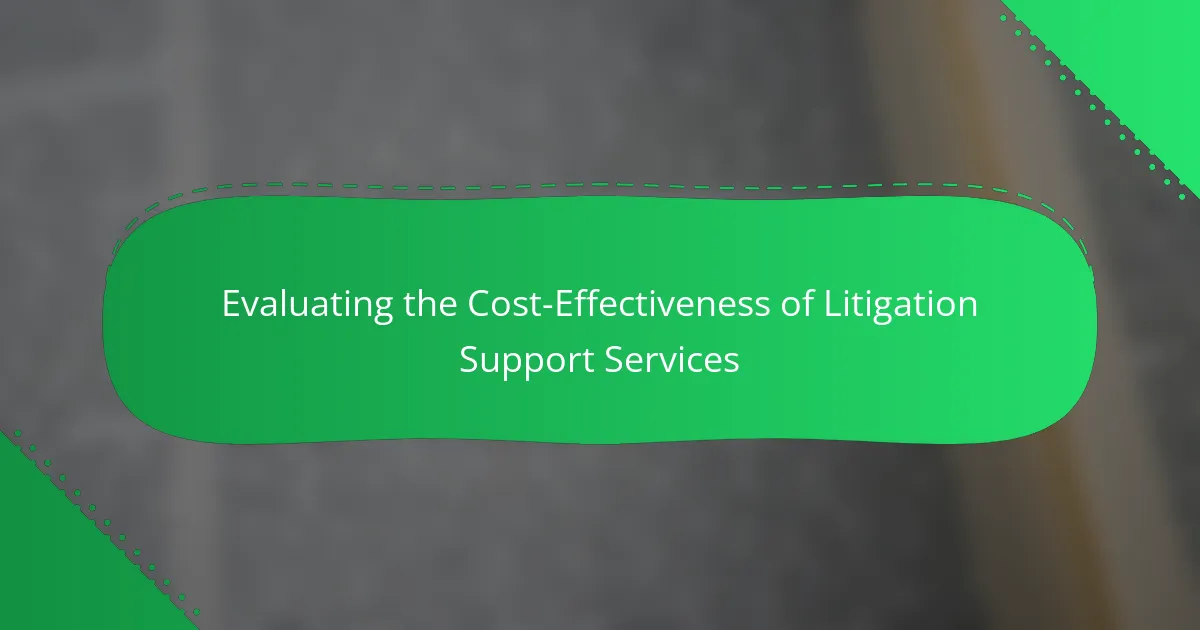Litigation support services are professional services designed to assist legal teams in managing cases efficiently. These services encompass document management, data analysis, trial preparation, electronic discovery, and expert witness services, all aimed at streamlining the litigation process. The article evaluates the cost-effectiveness of these services by analyzing direct and indirect costs, return on investment (ROI), and qualitative factors such as service quality and client satisfaction. It also addresses challenges in quantifying benefits, assessing upfront costs, and the variability in service quality among providers. Understanding these aspects is crucial for law firms to optimize resources and enhance case outcomes.

What are Litigation Support Services?
Litigation support services are professional services that assist legal teams in managing cases. These services include document management, data analysis, and trial preparation. They help streamline the litigation process and improve efficiency. Litigation support can involve electronic discovery, where data is collected and processed for legal review. It may also encompass expert witness services, which provide specialized knowledge in court. These services are essential for organizing complex information and presenting it effectively. Studies show that effective litigation support can reduce overall case costs and improve outcomes.
How do Litigation Support Services function in legal cases?
Litigation Support Services function by providing essential assistance to legal teams during litigation processes. These services include document management, electronic discovery, and trial preparation. They help organize and analyze large volumes of data, ensuring relevant information is accessible. Litigation support professionals utilize technology to streamline evidence collection and presentation. They also facilitate communication between parties involved in a case. By improving efficiency, these services can reduce the overall time and cost of litigation. Studies show that effective litigation support can lead to better case outcomes and increased client satisfaction.
What specific services are included in Litigation Support?
Litigation support includes a range of specific services. These services typically involve document management and organization. They also include electronic discovery, which is the process of identifying and producing electronically stored information. Additionally, litigation support encompasses trial preparation services. This may involve creating demonstrative evidence or trial graphics. Expert witness services are also part of litigation support. These experts provide testimony based on specialized knowledge. Furthermore, legal research services are included to assist in case preparation. All these services aim to enhance the efficiency and effectiveness of legal proceedings.
How do these services integrate with legal processes?
Litigation support services integrate with legal processes by providing essential tools and resources that enhance case management. These services streamline document management, making it easier for legal teams to organize and access information. They also offer data analysis capabilities, which can uncover critical insights relevant to a case. Additionally, litigation support services assist in electronic discovery, ensuring compliance with legal standards for evidence handling. Their integration helps reduce costs by improving efficiency and minimizing delays in the legal process. Studies show that firms utilizing these services experience faster case resolutions and lower operational expenses.
What are the key benefits of using Litigation Support Services?
Litigation Support Services provide essential assistance in legal cases. They enhance efficiency in case management and document handling. These services allow for thorough evidence organization and analysis. They also improve communication between legal teams and clients. Utilizing technology, they streamline data retrieval and presentation. This leads to more effective case strategies and outcomes. Furthermore, they can reduce overall litigation costs by minimizing time spent on administrative tasks. Studies indicate that firms utilizing these services experience a higher success rate in trials.
How do these services enhance case preparation?
Litigation support services enhance case preparation by providing specialized resources and expertise. They streamline document management and organization, making relevant information easily accessible. These services often include data analysis, which helps identify key facts and trends. Additionally, they offer technological tools that improve collaboration among legal teams. Enhanced communication leads to better strategy formulation. Moreover, these services can reduce time spent on administrative tasks. This efficiency allows legal professionals to focus on case strategy and client interaction. Overall, litigation support services contribute to a more thorough and effective case preparation process.
What value do they add to legal outcomes?
Litigation support services add significant value to legal outcomes by enhancing case preparation and strategy. These services provide access to specialized expertise, improving the quality of evidence presented. They help in organizing and analyzing data efficiently, leading to more informed decision-making. Additionally, they assist in managing timelines and resources effectively. Studies show that firms utilizing litigation support services often achieve better settlement outcomes. For example, a report by the American Bar Association indicates that 70% of cases with such support reached favorable resolutions. This demonstrates their critical role in optimizing legal processes and outcomes.

How is Cost-Effectiveness Evaluated in Litigation Support Services?
Cost-effectiveness in litigation support services is evaluated by comparing the costs incurred to the benefits gained. This evaluation involves analyzing direct costs such as fees for services and indirect costs like time savings. Metrics such as return on investment (ROI) and cost per case are commonly used. Additionally, qualitative factors like service quality and client satisfaction are considered. Data from previous cases can provide benchmarks for comparison. Studies indicate that effective litigation support can reduce overall litigation expenses significantly. This analysis helps law firms optimize their resources and improve case outcomes.
What metrics are used to assess cost-effectiveness?
Cost-effectiveness is assessed using several key metrics. Common metrics include cost per outcome, incremental cost-effectiveness ratio (ICER), and return on investment (ROI). Cost per outcome measures the total cost associated with achieving a specific result. ICER compares the difference in costs and outcomes between two interventions. ROI evaluates the financial return relative to the cost of the investment. These metrics help quantify the economic value of litigation support services. They also facilitate informed decision-making by comparing various options. Accurate assessment of these metrics is essential for effective resource allocation.
How do direct costs compare to potential savings?
Direct costs often exceed potential savings in litigation support services. Direct costs include expenses such as attorney fees, expert witness fees, and administrative costs. These can accumulate quickly, potentially reaching tens of thousands of dollars. In contrast, potential savings from effective litigation support may only reduce costs by a fraction of that amount. Studies indicate that organizations can save around 20% on litigation expenses with optimized support services. However, these savings may not always offset the initial direct costs incurred. Thus, while litigation support can offer savings, the relationship between direct costs and potential savings is often unfavorable.
What role does return on investment play in evaluation?
Return on investment (ROI) plays a crucial role in the evaluation of litigation support services. It quantifies the financial benefits gained from the services relative to their costs. Evaluating ROI helps organizations assess the effectiveness of their expenditures. A positive ROI indicates that the benefits outweigh the costs, making the investment justifiable. Conversely, a negative ROI suggests inefficiency and potential reconsideration of the services utilized. Studies show that businesses that analyze ROI can enhance decision-making processes. For instance, a report by the Association of Corporate Counsel found that companies that measure ROI on legal services improve budget allocation by 25%. Thus, ROI serves as a key metric for evaluating the cost-effectiveness of litigation support services.
Why is understanding cost-effectiveness important for legal teams?
Understanding cost-effectiveness is crucial for legal teams as it directly impacts resource allocation and case strategy. Legal teams must assess the financial implications of litigation support services. This evaluation helps in identifying services that provide the best value for money. According to a study by the American Bar Association, effective cost management can enhance a firm’s profitability. Additionally, understanding cost-effectiveness aids in making informed decisions about hiring external experts or utilizing in-house resources. This strategic approach can lead to better outcomes and improved client satisfaction.
How does it influence decision-making in legal strategies?
Litigation support services influence decision-making in legal strategies by providing critical data analysis and case management tools. These services enhance the efficiency of legal teams. They allow for better resource allocation, reducing unnecessary expenditures. Access to comprehensive data aids in identifying strengths and weaknesses in cases. This information can lead to more informed legal arguments. Additionally, litigation support can streamline communication among team members. Improved collaboration often results in quicker decision-making processes. Ultimately, these services contribute to more effective legal strategies and potentially favorable outcomes.
What impact does it have on budget allocation?
The impact of litigation support services on budget allocation is significant. These services can lead to increased costs due to their specialized nature. However, they can also result in cost savings by improving efficiency and reducing trial duration. For instance, effective litigation support can streamline document review processes, which minimizes man-hours needed. Studies show that firms utilizing these services often experience a higher success rate, justifying their expense. Additionally, allocating budget towards these services can enhance overall case management. This strategic investment can ultimately lead to better financial outcomes for legal firms.

What are the Challenges in Evaluating Cost-Effectiveness of Litigation Support Services?
Evaluating the cost-effectiveness of litigation support services presents several challenges. One significant challenge is the difficulty in quantifying the benefits of these services. Many benefits are intangible, such as improved decision-making and enhanced case strategy. Additionally, there is often a lack of standardized metrics for measuring effectiveness. Different firms may use varying criteria, complicating comparisons.
Another challenge involves the upfront costs associated with litigation support services. These costs can be substantial, making it hard to assess long-term value. Moreover, the dynamic nature of legal cases adds complexity. Outcomes can depend on numerous variables, making it difficult to isolate the impact of support services.
Furthermore, there is often a time lag between the provision of services and the realization of benefits. This delay can hinder timely evaluations. Finally, the variability in service quality can affect perceived effectiveness. Different providers may deliver varying levels of service, complicating the evaluation process.
What common obstacles do legal teams face in this evaluation?
Legal teams face several common obstacles in evaluating the cost-effectiveness of litigation support services. One significant challenge is the difficulty in quantifying the return on investment (ROI) for these services. Legal teams often struggle to link specific outcomes to the costs incurred. Another obstacle is the variability in service quality among different providers. This inconsistency makes it hard to assess value accurately. Additionally, legal teams may encounter budget constraints that limit their ability to invest in comprehensive evaluations. There is also the complexity of integrating new technologies with existing systems, which can hinder effective assessment. Lastly, the rapidly changing legal landscape can complicate the evaluation process, as teams must adapt to new regulations and practices.
How do varying service providers complicate assessments?
Varying service providers complicate assessments by introducing inconsistency in service quality and pricing. Different providers may use varied methodologies for data collection and analysis. This inconsistency can lead to discrepancies in the results of assessments. Additionally, providers may specialize in different areas, affecting the comparability of their services. For example, one provider might focus on document management while another specializes in expert testimony. Such specialization makes it difficult to evaluate overall cost-effectiveness. Furthermore, differing levels of expertise among providers can impact the reliability of assessments. This variability necessitates careful consideration when comparing costs and outcomes.
What factors can skew cost-effectiveness results?
Factors that can skew cost-effectiveness results include biased data, incorrect assumptions, and incomplete analysis. Biased data can arise from selective reporting or data manipulation. Incorrect assumptions may involve overestimating benefits or underestimating costs. Incomplete analysis can lead to overlooking relevant variables or alternative options. These issues can distort the true value of litigation support services. For example, a study by Drummond et al. (2015) highlights that improper data handling can significantly alter cost-effectiveness outcomes.
What best practices can improve the evaluation process?
Establishing clear criteria is essential to improve the evaluation process. Specific metrics help assess performance effectively. Utilizing standardized evaluation forms ensures consistency across assessments. Involving multiple evaluators reduces bias and enhances objectivity. Regular training for evaluators improves their skills and understanding of the evaluation criteria. Gathering feedback from stakeholders provides insights for continuous improvement. Documenting the evaluation process creates a transparent record for future reference. These practices align with findings from the American Evaluation Association, which emphasizes systematic approaches to enhance evaluation quality.
How can legal teams standardize their evaluation methods?
Legal teams can standardize their evaluation methods by implementing clear criteria and frameworks for assessment. Establishing a uniform set of metrics ensures consistency across evaluations. These metrics may include cost analysis, outcome tracking, and time efficiency. Utilizing technology for data collection enhances accuracy and reduces human error. Regular training sessions for team members can reinforce the standardized approach. Additionally, creating a centralized database for storing evaluation results promotes transparency and accessibility. This process aligns with best practices in legal project management, as outlined by the Project Management Institute. Standardization leads to improved decision-making and resource allocation.
What tools or resources can assist in this evaluation?
Cost-effectiveness evaluation of litigation support services can be assisted by various tools and resources. Financial analysis software helps quantify costs and benefits effectively. Examples include Microsoft Excel and specialized legal budgeting tools. Benchmarking reports provide industry standards for comparison. They can highlight average costs and outcomes associated with litigation support. Case management systems track expenses and performance metrics over time. Examples include Clio and MyCase. Legal analytics platforms offer insights into case trends and success rates. Notable platforms include Lex Machina and Westlaw Edge. Additionally, consulting industry experts can provide tailored advice based on specific needs. These resources collectively enhance the evaluation process by providing factual data and analytical capabilities.
Litigation support services are professional services that assist legal teams in managing cases through document management, data analysis, and trial preparation. This article evaluates the cost-effectiveness of these services by examining their impact on resource allocation, case strategy, and overall litigation expenses. Key metrics for assessing cost-effectiveness, such as return on investment (ROI) and cost per outcome, are discussed along with common challenges faced by legal teams in this evaluation process. Additionally, best practices and tools to improve the evaluation of litigation support services are highlighted, providing insights into optimizing legal operations and enhancing case outcomes.



